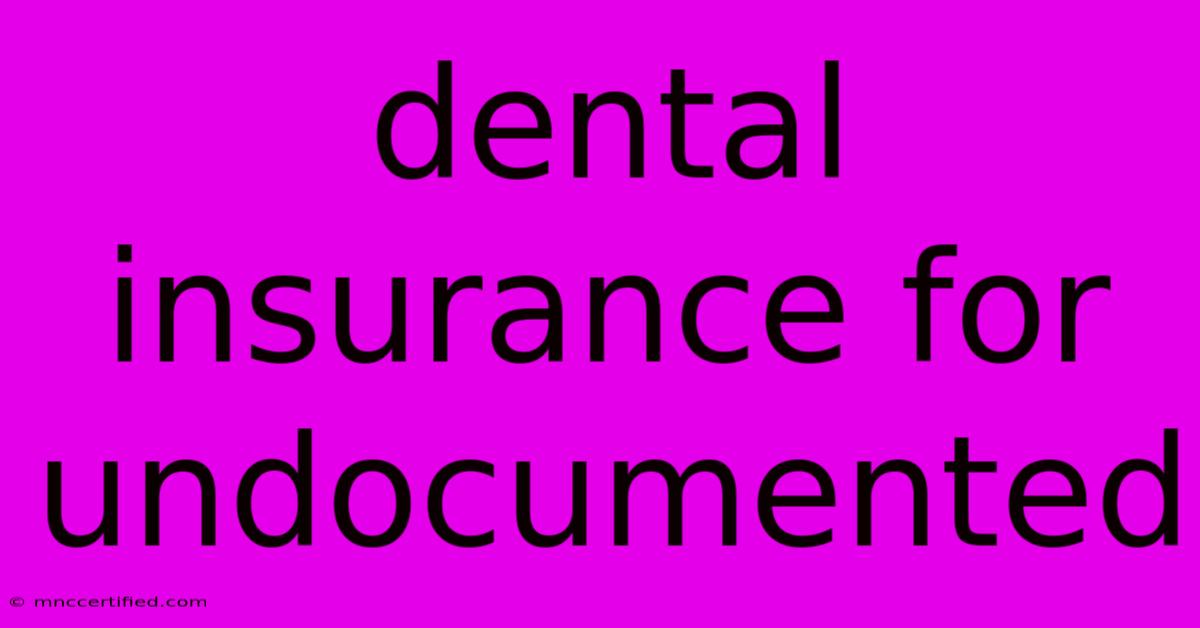Dental Insurance For Undocumented

Table of Contents
Dental Insurance for Undocumented Immigrants: Navigating the System
Access to affordable healthcare, including dental care, is a significant challenge for many undocumented immigrants in the United States. While they may not qualify for government-sponsored programs like Medicaid or CHIP, several options exist to help them obtain necessary dental services. This article explores the avenues available for securing dental insurance and affordable dental care for undocumented individuals.
Understanding the Challenges
Undocumented immigrants face unique hurdles when seeking healthcare, primarily due to their immigration status. Many fear deportation, leading them to avoid seeking medical attention, even in emergency situations. Lack of legal status often excludes them from employer-sponsored insurance plans and government assistance programs. This creates a significant barrier to accessing routine and emergency dental care, leading to potentially severe health complications.
The High Cost of Neglecting Dental Health
Neglecting dental health can have devastating consequences. Untreated cavities can lead to severe pain, infections, and even the loss of teeth. Gum disease can contribute to heart disease and other systemic health problems. For undocumented immigrants, the financial burden of emergency dental care, often significantly higher than preventative care, can be catastrophic.
Finding Affordable Dental Care Options
While comprehensive dental insurance might be out of reach, several options can make dental care more accessible:
1. Community Health Centers (CHCs):
CHCs are non-profit organizations that provide affordable healthcare services to underserved populations, including undocumented immigrants. Many CHCs offer a sliding fee scale based on income, making care more affordable. They often have dental clinics on-site or can refer patients to dentists who accept their payment model. Search online for "community health centers near me" to find one in your area.
2. Federally Qualified Health Centers (FQHCs):
Similar to CHCs, FQHCs are government-funded health centers that offer a sliding fee scale for services. They often prioritize serving low-income individuals and families, regardless of immigration status. Check the Health Resources & Services Administration (HRSA) website to locate an FQHC in your area.
3. Dental Schools and Teaching Clinics:
Dental schools often have teaching clinics where students, under the supervision of experienced dentists, provide dental services at a reduced cost. These clinics offer a valuable opportunity to receive affordable care while supporting dental education. Contact local dental schools to inquire about their patient programs.
4. Non-profit Organizations and Charities:
Numerous non-profit organizations and charities offer dental assistance to low-income individuals and families, including undocumented immigrants. These organizations may provide free or reduced-cost dental services, depending on the individual's circumstances. Search online for "dental charities near me" or "free dental care [your city/state]" to find local resources.
5. Payment Plans and Financing Options:
Some dental practices offer payment plans or work with financing companies to help patients manage the cost of dental treatment. This can allow patients to break down larger payments into more manageable installments. Always discuss payment options with your chosen dental practice before proceeding with treatment.
Advocacy and Legal Considerations
Advocacy groups are working to improve access to healthcare for undocumented immigrants. Supporting these organizations can help create positive change. Furthermore, understanding your legal rights and responsibilities is crucial. While seeking healthcare, undocumented individuals should be aware of their rights and protections under existing laws.
Conclusion: Accessing Necessary Care
Access to dental care for undocumented immigrants remains a critical issue, but through diligent research and exploration of the available resources, affordable options can be found. By utilizing community health centers, dental schools, non-profit organizations, and responsible financing strategies, individuals can take proactive steps to address their dental health needs and improve their overall well-being. Remember to thoroughly research local options and don't hesitate to ask questions about payment plans and financial assistance. Your oral health is important, regardless of your immigration status.

Thank you for visiting our website wich cover about Dental Insurance For Undocumented. We hope the information provided has been useful to you. Feel free to contact us if you have any questions or need further assistance. See you next time and dont miss to bookmark.
Featured Posts
-
Eyelid Surgery Insurance Coverage
Nov 19, 2024
-
Game Awards 2024 Nominations Astro Bot Final Fantasy Dominate
Nov 19, 2024
-
Trump Selects Carr For Fcc Head
Nov 19, 2024
-
Carsleys England Youth Team Succession
Nov 19, 2024
-
Kemper Life Insurance Longview Tx
Nov 19, 2024